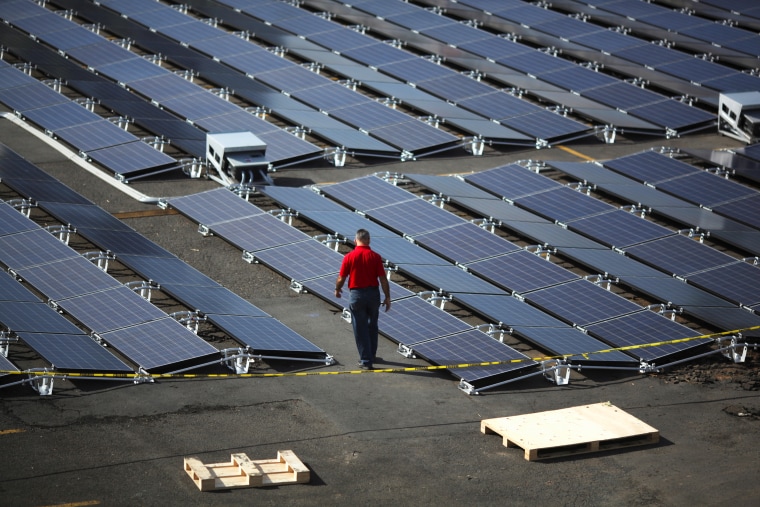Puerto Rican Gov. Pedro Pierluisi is meeting with administration and agency officials in Washington on Wednesday as part of a formal agreement to revamp the U.S. territory’s outdated electric grid and move toward renewables.
Three federal agencies — the Departments of Energy, Homeland Security and Housing and Urban Development — are signing an agreement to align federal investments with local policies to start transitioning into clean energy by 2025, with the goal of achieving 100 percent renewable electricity by 2050.
The Biden administration says it's part of a commitment to ensure that $12 billion in federal aid for Puerto Rico's energy sector leads to a more resilient and sustainable grid, which is consistent with Biden's climate resilience goals, Pat Hoffman, principal deputy assistant secretary for the Office of Electricity at the Department of Energy, told NBC News.
“We recognize that there is a long way to go, given that less than 3 percent of generation in Puerto Rico comes from renewable energy,” Hoffman said.
Biden's national climate change agenda includes zeroing out federal carbon dioxide emissions by 2050 and transitioning to 100 percent clean electricity by 2030.
The $12 billion in federal funds to revamp Puerto Rico’s electric system was approved after the island was devastated by Hurricane Maria in 2017, decimating its outdated electric grid and triggering the world’s second-longest blackout.
The signing of the agreement ramps up efforts by the Department of Energy to conduct a community-driven study, known as PR100, funded by the Federal Emergency Management Agency, to evaluate pathways for Puerto Rico to achieve 100 percent renewable energy by 2050.
The Department of Energy will be using its national laboratories as well as providing technical assistance, "as we think about different scenarios to achieving this goal," Hoffman said.
The final findings of the PR100 study will be ready by 2024.
The study is modeled after the Los Angeles “100% Renewable Energy Study,” also known as LA100, which found that the city's goal of achieving 100 percent renewable electricity by 2045, or even 2035, is feasible and will provide benefits related to air quality, greenhouse gas emissions and public health if coupled with electrification of other sectors, according to the Department of Energy.
Some of the Department of Energy laboratories that will be in charge of the PR100 study worked with Hawaii on their clean energy initiative, looking at available natural resources and ways to adapt local infrastructure and the local economy.
The Department of Housing and Urban Development will be assisting Puerto Rico’s housing department with a plan to provide financial assistance to low-and moderate -income communities looking to implement decentralized renewable energy resources, including installing necessary microgrids.
The disinvestment in Puerto Rico's power grid goes back decades as limited access to capital and the funding of current spending through long-term debt led to little maintenance and an outdated grid that worsened the power system’s overall performance. The deterioration was exacerbated by Hurricane Maria.
In a statement, Pierluisi said energy transformation was one of his administration's top priorities. "I will make sure that every federal fund appropriated to Puerto Rico and allocated for the reconstruction of the power grid is used efficiently and effectively."
At least 138 energy-related projects are expected to begin construction this year, including repairing islandwide electric substations, according to the Department of Energy.
“This administration is making unprecedented investments in communities to help them adapt and become more resilient," Homeland Secretary Alejandro Mayorkas said in a statement. "We will continue to provide the necessary resources to achieve these goals.”
Follow NBC Latino on Facebook, Twitter and Instagram.

